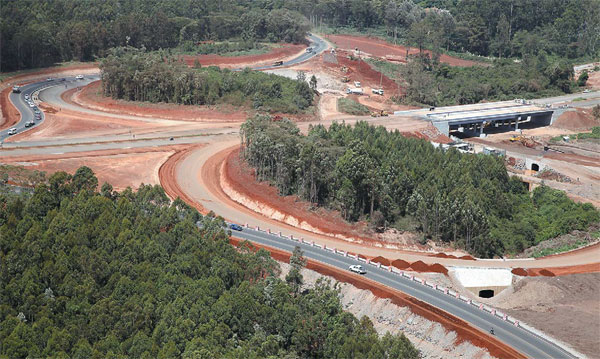Chinese-Built Ring Road Network Reduces Congestion in Nairobi

China Road and Bridge Corp constructs a bypass, a stretch of 28.6 kilometers, in southern Nairobi. [Photo provided to China Daily]
Chinese-built ring roads are reducing traffic jams in Kenya's capital city Nairobi through the development of a loop line around East Africa's largest urban center that provides alternative routes for moving around the area.
The Nairobi ring road network master plan consists of the northern, eastern, southern and western bypasses and was built in order to reduce traffic jams around the city center by navigating around the metropolis.
The Nairobi southern bypass, constructed by China Road and Bridge Corp (CRBC), was completed in 2016.
The road was funded jointly by the China Exim Bank and the Kenyan government.
The 28.6-kilometer bypass dual carriageway begins on the southern edges of the capital city on the Nairobi-Mombasa Road, passes through Gitaru in the northern part of the town and connects to the western bypass.
The CRBC began construction of the western bypass at a cost of 17 billion shillings ($157 million) in 2019.
James Macharia, cabinet secretary, Ministry of Transport, Infrastructure, Housing and Urban Development, said that the 16 km western bypass will be completed by the end of 2021.
Macharia observed that the dual carriageway will play a big role in decongesting Nairobi city by providing an alternative route to move within the city.
The eastern bypass, which was already in use, was constructed by CRBC and forms a ring road that connects the southeastern and northeastern outer fringes of Nairobi and also links the northern bypass and southern bypass.
The 32-km eastern bypass runs from Nairobi-Mombasa road in the southern part of Nairobi and terminates in Ruiru in Kiambu county.
Also operational is the northern bypass that commences at Ruaka in the northwestern part of Nairobi and links to the eastern bypass in Ruiru.
The 21-km highway was also constructed by CRBC as a single carriageway to reduce traffic congestion in Nairobi.
Kenya National Highway Authority (KeNHA) said that ring roads are a vital part of the city's infrastructure due to the rapid increase in population and number of vehicles on Nairobi's road that has resulted in serious traffic congestion.
Brian Misori told Xinhua News Agency on July 20 that the completed Nairobi bypasses are already helping reduce the amount of time motorists spend on the road.
The 50-year-old uses the southern bypass to commute between his home in Mlolongo and his place of work in Kikuyu town.
"I am now able to reach my destination in 40 minutes as compared to two hours before because I don't have to travel through Nairobi's city center," he added.
Donald Kigen is also a beneficiary of the Nairobi bypasses that have been constructed by Chinese firms.
The 55-year-old engineer lives in Nairobi's Utawala residential estate and he uses the eastern and northern bypasses to reach his office which is located in Ruaka, about 16 km northwest of the city center.
He observed that by avoiding the city center, he is able to reach his destination in less than one hour as compared to two hours before.
